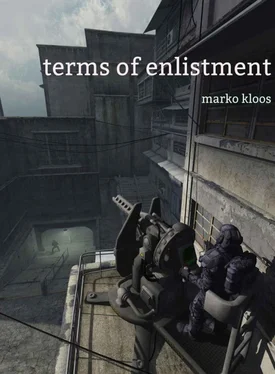By the time we’re over the terraforming station again, I’m definitely ready for a new career in the custodial services, far away from drop ships and emergency crash pods. As we descend through the weather, it feels like the ship is getting shoved around at random in all directions, but Halley is icy calm on the controls, so I once again shut up and try to meld with my seat. Even with the infrared feed from my helmet, I don’t see the lights of the station’s buildings until we’re just a few hundred feet above the landing pad. Then we’re on the ground, before I have a chance to become concerned with our rate of descent. As soon as the drop ship settles on its skids on the gravel of the landing pad, Halley cuts the throttle and exhales sharply.
“Remind me to log this flight when we get back,” she says. “I’ll put it under ‘Shit Weather Flying’. Thirty-knot winds, my ass.”
The dash from the landing pad to the nearest building is less than a hundred yards, but by the time we’ve made it into the building, we’re soaked to our bones.
“I’m wiped out,” Halley says to me as we shake the rainwater out of our hair inside the admin building, leaving puddles on the rubberized floor. “I love flying and all, but holding that stick for ten hours straight is a bit of a bear.”
“How long has it been since you’ve slept?” the XO asks her. Halley shrugs.
“No idea, sir. I was just getting off watch when the ship got hit. Twenty-four hours, maybe?”
“You go find some dry clothes somewhere,” the XO orders. “I’m sure the Marines have some spare fatigues stashed away somewhere. Find yourself some chow and a cot, and crash for a while. That goes for you, too, Mister Grayson,” he adds.
The terraforming station has living quarters for the techs and the garrisoned Marine squad, but we don’t want to claim someone else’s bed, so Halley and I set up a pair of folding cots in one of the many storage rooms. I’ve been on a steady dose of adrenaline and fear since the Versailles got hit, and I haven’t much felt like sleeping until now, but the relative safety of the warm storage room suddenly makes me feel my fatigue. We lean our rifles against the nearby wall, and exchange our soaked Navy clothes for dry Marine ICUs before lying down on the creaky cots.
“I’m scared shitless,” Halley says as we listen to the low humming of the environmental system. The cots are short, and far less comfortable than our bunks back on the ship. The blankets are scratchy and smell like they’ve been in a dusty storage locker for the last five years.
“Gee, I can’t imagine why,” I reply. “Lush planet, friendly locals…”
“Do you ever stop being a smartass, Andrew?”
“No, I don’t. You see, it’s my defense mechanism, to cover up the fact that I’m scared shitless, too.”
“I see,” she smiles. “Glad I’m not the only one. Aren’t we just the biggest shit magnets?”
“You have no idea,” I say.
Sometime later, someone runs past the door of the storage room, and I jerk awake. It feels like I’ve been dozing only for a few minutes, but when I check the time, I find that we’ve been asleep for over six hours.
There’s a rumbling in the air that’s so low I can feel it more than I can hear it. The floor under our cots vibrates almost imperceptibly. Then the tremor is gone, only to return a few seconds later, this time just a little more noticeable than before. It sounds like a very faint earthquake, or artillery shells exploding at a great distance. Something about the low and steady vibrations makes me feel a great swell of unease.
Next to me, Halley stirs on her cot, and I reach over to shake her awake.
“Get up, and get your boots on. Come on.”
The low-frequency vibrations beneath our feet return every few seconds, each time just a little stronger. Each tremor is accompanied by a low rumbling in the air, slow and regular, like the beating of a giant heart.
“What the hell is that?” Halley asks, her voice still thick with sleep.
“I think we’re in deep shit,” I reply.
Overhead, the base alarm starts bleating.
We put on our boots, grab our rifles, and dash over to the mess hall, where the rest of our little crew is already busy charging weapons and fastening harness straps.
“Everyone grab a commo kit,” the XO says as we come into the room.
“What’s the story, sir?” I ask.
“The Marines up on the roof say we have incoming. They can’t see what it is yet, but it’s coming through the soup from the north. I’m going to go ahead and guess it’s pretty fucking big.”
Underneath our feet, the floor of the station shakes again slightly, as if to emphasize his statement.
“Marines,” Corporal Harrison shouts. “Grab some launchers, and let’s get up on that roof.”
Our Versailles Marines are now wearing partial battle armor-helmets, chest plates, and leg armor, undoubtedly borrowed from the local garrison supplies. They each take a MARS launcher off the tables where the drop ship’s armory is spread out, and then file out of the door at a run. We’re left in the mess hall with a few Navy console jockeys, and a small group of worried-looking civilian techs.
“Anyone knows how to use a rifle, you best grab one now,” the XO tells the civilians.
I have the rifle from the drop ship, but I still walk up to the tables with the remnants of the drop ship armory, to see what the Marines have left for us. All the MARS launchers and rocket cartridges are gone, but there are plenty of rifle grenades left. I slip a spare harness over my clean Marine ICUs, and start filling the loops and pouches with rifle magazines and forty-millimeter grenades. Next to me, Halley is doing the same. The civvie techs are just milling about anxiously, eyeing the two of us, and studying the rifles left on the table like some vaguely interesting, but scary artifacts.
“Where do you want us, sir?” Halley asks the Commander when we have finished gearing up.
“Hell, I don’t know,” he says. “Find a good spot to use those rifles, I suppose. The jarheads are all up on the roof of the main building. Someone needs to stay here and work the comms.”
“We have a shelter,” the civilian administrator says. “It’s in the main unit, down in the basement level. It’s got its own air supply and comms gear.”
“Outstanding,” the Commander says. “You civilians go and hole up there. Lieutenant Benning, go with them and make sure someone answers the phone if the Navy shows up and starts calling. The rest of you, let’s go topside and add a few more rifles to the squad. Let’s go, people, before our guests get here.”
The rain has slacked off in the hours since we landed the drop ship. The roof of the atmospheric processing station is a flat, rubber-coated surface the size of a city block. The wet rubber squishes under our boots as we rush from the access door to the edge of the roof, where the Marines have spread out in fighting positions. Even the short side of the building is at least a hundred yards wide, and the three fire teams spread out along the edge of the roof have an awful lot of empty space between them. The fire team on the right corner is setting up a crew-served automatic weapon, a large-bore machine gun that’s mounted on a tripod, and fed from large translucent ammunition canisters.
“Friendlies to the rear,” the XO shouts as we come up behind the Marines in the middle of the roof. “We brought you a few more trigger pullers, Sergeant.”
“Can’t hurt, sir,” Sergeant Becker says. “The more, the merrier.”
“Where do you want us, son? I’ll let you run your own show here, ‘cause I’m worthless as a ground pounder. You just tell me where to stand, and when to shoot.”
Читать дальше












